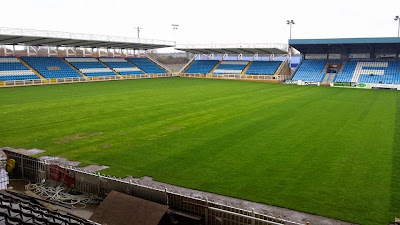In many ways Peter Fox redefined modern rugby league coaching, and the impact of his style and charisma was felt not only at Featherstone Rovers, but across the whole game. An abrasive and forthright speaker, he began coaching at Featherstone at a time when the power of a first team coach was limited in that a selection committee chose the team. Fox was the first man to change that, and put that power into his own hands. Just as forceful characters like Brian Clough were beginning to emerge in football, so Fox and Alex Murphy brought a new cult of personality to RL coaching. A keen student of psychology and man management, Fox put this to good effect on the teams he managed. He had been a modest player, very much in the shadow of his two hugely talented younger brothers Don and Neil, but as a shrewd tactician, motivator and team builder he proved to be the brightest of his generation.
Given his later success, it’s hard to believe his coaching career could have been over before it had hardly started. His first half season with Featherstone was a disaster, having taken over mid-season from Laurie Gant. The team immediately nose-dived and won only six games of his first 22 in charge. Luckily for him and the club, the board kept faith with this fiery character and within a couple of seasons his obvious skills had begun to bear fruit. Fox inspired awesome loyalty in his players, a quality which went a long way, giving youngsters the self confidence to develop and old hands the desire to keep going. By the time Featherstone reached the 1973 Cup final the side bore the indelible stamp of “manufactured by Peter Fox” right through it.
In his first full season in charge Rovers recovered to finish seventh in the league, and followed that with a best ever (at the time) finish of second in 1973, just two points behind league leaders Warrington. The following season Rovers dropped back to eighth but enjoyed a Wembley return to the 1974 Cup final.
Peter Fox was in charge a total of three and a half seasons, a relatively short time compared to his predecessors, but his impact was undeniable. No other coach would remain in the head coach position for even this modest length of time until Fox returned in the late eighties. Indeed, the club embarked on a coaching merry-go-round for much of the rest of the 1970s and early 1980s.
In May 1974 after a Wembley defeat against Warrington, Fox quit Featherstone for the first time and left to coach local rivals Wakefield, where he had less success. Whilst coach of Bradford during eight seasons he brought them two Championships built on a familiar foundation of ex-Featherstone players, and coached Great Britain for just a single series against Australia. He probably trod on too many officials’ toes to be invited to remain as national team coach. After a short stint at Leeds he came back to Featherstone in 1987, a period to be covered later in this series.
Peter Fox’s coaching record:
70/1: Won 6-Lost 16 (part season only)
71/2: Won 25-Drew 1-Lost 14
72/3: Won 35-Lost 10
73/4: Won 23-Drew 2-Lost 20
Total: Won 89-Drew 3-Lost 60= 59.54%









